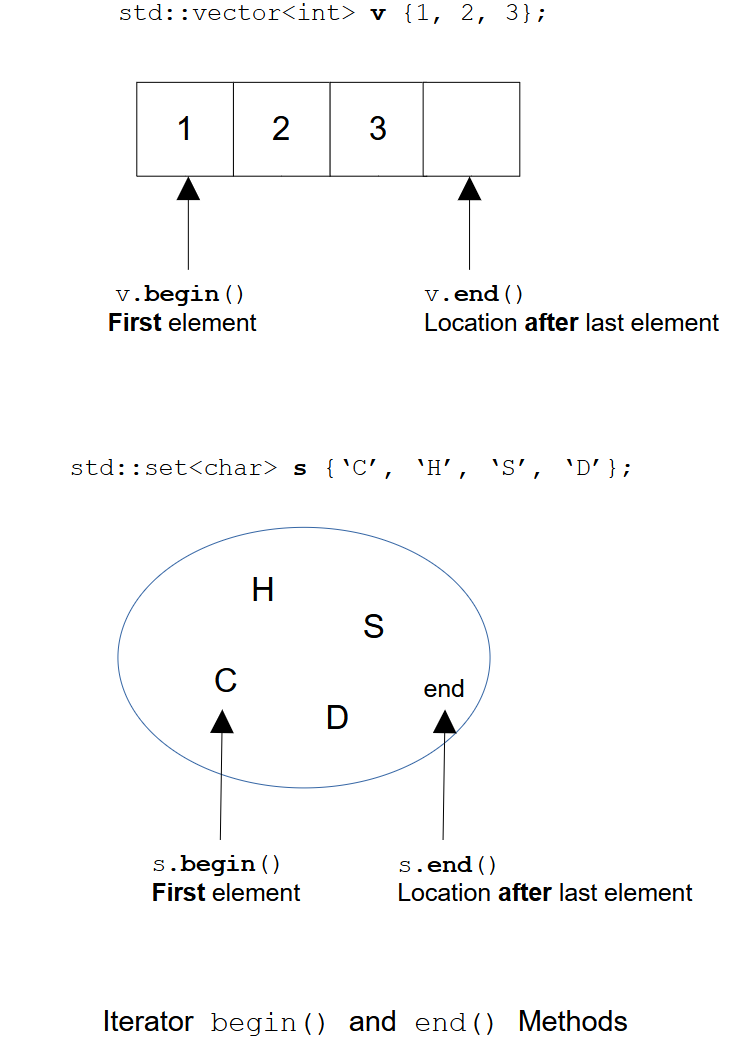Home | Projects | Notes > C++ Programming > Introduction to STL Iterators
Introduction to STL Iterators
Iterators
Iterators allow you to abstract any container as a sequence of elements, without needing to know how the container is implemented under the hood.
They are implemented as template classes and behave like pointers by design—you can use operators like
*(dereference),++/--(increment/decrement), etc.Most container classes support traversal using iterators.
Exceptions include container adapters such as
std::stackandstd::queue, which do not provide iterator access.
Declaring Iterators
Iterators must be declared based on the container type they will iterate over.
11container_type::iterator_type iterator_name;41std::vector<int>::iterator it1; // Can only be used to iterate over 'vector<int>'2std::list<std::string>iterator it2;3std::map<std::string, std::string>::iterator it3;4std::set<char>::iterator it4;
begin() and end() Methods
Note that the
end()does not point to the last element but the one PAST the last element and is not dereferenceable. (Accessing*end()is undefined behavior.)

Initializing Iterators
To initialize iterators:
21std::vector<int> v {1, 2, 3};2std::vector<int>::itrator it = v.begin();or let the compiler deduce the type by using
autokeyword:11auto it = v.begin();More readable, writable and easier to debug.
If the vector is empty,
v.begin()will returnv.end().
Iterator Operations
The following table sumarizes the most commonly used iterator operations.
It is assumed that
itis an iterator, andiis an integer.Function Description Type of Iterator ++itPre-increment All it++Post-increment All it = it1Assignment
(LHS and RHS types must be the same)All *itDereference Input and output it->Arrow operator Input and output it == it1Comparison for equality Input it != it1Comparison for inequality Input --itPre-decrement Bidirectional it--Post-decrement Bidirectional it + i,it += iit - i,it -= iIncrement and decrement Random access it < it1,it <= it1it > it1,it >= it1Comparison Random access Using iterators -
std::vector71std::vector<int> v {1, 2, 3};2std::vector<int>::iterator it = v.begin();3while (it != v.end())4{5std::cout << *it << " ";6++it;7}111 2 3Can also use
forloop instead ofwhileloop:41for (auto it = v.begin(); it != b.end(); it++)2{3std::cout << *it << " ";4}This is how the range-based
forloop works.Using iterators -
std::set61std::set<char> s {'C', 'H', 'S', 'D'};2auto it = s.begin();3while (it != s.end())4{5std::cout << *it << " " << std::endl;6}11C H S DThe same pattern as with the
std::vector.
Reverse Iterators
Reverse iterators works in reverse direction. The last element is the first and the first is the last. (
++moves backward,--moves forward.)71std::vector<int> v {1, 2, 3};2std::vector<int>::reverse_iterator rit = v.begin(); // Points to the last element3while (rit != v.end())4{5std::cout << *it << " ";6++it; // Here ++ moves backward7}113 2 1
Other Iterators
begin()andend()-iteratorcbegin()andcend()-const_iteratorrbegin()andrend()-reverse_iteratorcrbegin()andcrend()-const_reverse_iterator
Project: Various Usages of Iterators
x
1
7// Display any vector of integers using range-based for loop8void print(const std::vector<int> &v)9{10 std::cout << "[ ";11 for (auto const &n : v)12 {13 std::cout << n << " ";14 }15 std::cout << "]" << std::endl;16}17
18void test1(void)19{20 std::cout << "\nTEST1" << std::endl;21 22 std::vector<int> v{1, 2, 3, 4, 5};23 auto it = v.begin(); // Points to 124 std::cout << *it << std::endl;25 26 it++; // Points to 227 std::cout << *it << std::endl;28 29 it += 2; // Points to 430 std::cout << *it << std::endl;31 32 it -= 2; // Points to 233 std::cout << *it << std::endl;34 35 it = v.end() - 1; // Points to 536 std::cout << *it << std::endl;37 38}39
40// Display all vector elements using an iterator.41void test2(void)42{43 std::cout << "\nTEST2" << std::endl;44
45 std::vector<int> v{1, 2, 3, 4, 5};46
47 std::vector<int>::iterator it = v.begin();48
49 while (it != v.end())50 {51 std::cout << *it << std::endl;52 it++;53 }54
55 // Change all vector elements to 0.56 it = v.begin();57 while (it != v.end())58 {59 *it = 0;60 it++;61 }62
63 print(v);64}65
66// Using a const iterator.67void test3(void)68{69 std::cout << "\nTEST3" << std::endl;70
71 std::vector<int> v{1, 2, 3, 4, 5};72 std::vector<int>::const_iterator cit = v.begin();73 // auto cit = v.cbegin();74
75 while (cit != v.end())76 {77 std::cout << *cit << std::endl;78 cit++;79 }80
81 // Compiler error upon an attempt to change elements82 cit = v.begin();83 while (cit != v.end())84 {85 // *cit = 0; // Compiler error - read only!86 cit++;87 }88}89
90// More iterators.91void test4(void)92{93 // Using a reverse iterator over a vector.94 std::vector<int> v{1, 2, 3, 4};95 auto rit = v.rbegin(); // Starts at 4.96 while (rit != v.rend())97 {98 std::cout << *rit << std::endl;99 rit++;100 }101
102 // Const reverse iterator over a list (implemented as doubly-linked list).103 std::list<std::string> l{"Kyungjae", "Sunny", "Yena"};104 auto crit = l.crbegin(); // Points to Yena.105 std::cout << *crit << std::endl;106 crit++; // Points to Sunny.107 std::cout << *crit << std::endl;108
109 // Iterator over a map.110 std::map<std::string, std::string> m{111 {"Kyungjae", "C++"},112 {"Sunny", "Python"},113 {"Yena", "Assembly"}114 };115 auto it = m.begin(); // Iterator over map of <string, string> pairs.116 while (it != m.end())117 {118 std::cout << it->first << ":" << it->second << std::endl;119 it++;120 }121}122
123// Iterator over a subset of a container124void test5(void)125{126 std::cout << "\nTEST5" << std::endl;127 128 std::vector<int> v{1, 2, 3, 4, 5, 6, 7, 8, 9, 10};129 auto s = v.begin() + 2; // Start130 auto e = v.end() - 3; // End131 while (s != e)132 {133 std::cout << *s << std::endl;134 s++;135 }136}137
138int main(int argc, char *argv[])139{140 test1();141 test3();142 test3();143 test4();144 test5();145 return 0;146}1371
2TEST131425462758
9TEST310111212313414515
16TEST317118219320421522423324225126Yena27Sunny28Kyungjae:C++29Sunny:Python30Yena:Assembly31
32TEST5333344355366377